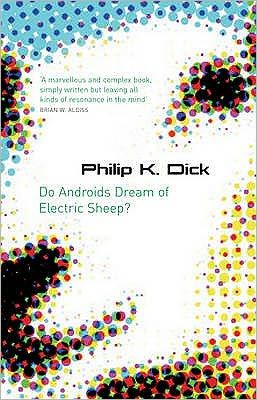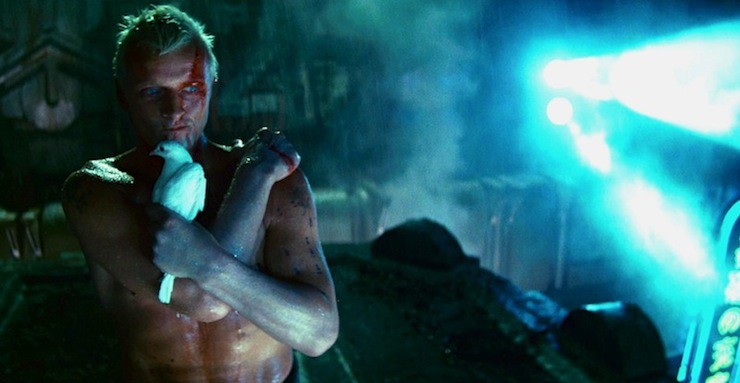I’ve never liked Blade Runner. I know it’s innovative, I know it’s been imitated by countless other movies (I’ve seen at least a dozen of them) but I’ve never been able to forgive it for cutting out the beating heart of the novel on which it was based.
Gone is Rick Deckard leafing through his Sidney’s catalogue and gazing through the windows of pet shops. Gone is the electric sheep, and all the other animals which sometimes seem real but then turn out to be electric too. Gone too is the religion of Mercerism, whose central story is exposed by androids as a blatant fake, and yet continues to be true in a way that androids simply can’t comprehend—and gone is the subtlety of that whole paradox about truth which is so central to Dick’s vision. And where is the Ajax model Mountibank Lead Codpiece? Where is the counterpart of Dick’s lovely prose, sometimes rushed and careless, but always muscular and vivid? And above all, where is the humour, the humour and the good humour, that characterises Dick’s work? In their place—what? The lazy sentimentality of ‘attack ships on fire off the shoulder of Orion’?
Yes, sentimentality. Sentimentality is not a particular kind of emotion, but emotion of any kind that’s triggered rather than truly earned. Unearned darkness can be as sentimental as sugary sweetness. Dick earns his darkness by not wallowing in it—we only wallow in fake darkness—but rather by fighting it all the time with humour and Quixotic hope: Deckard outside the petshop in a dying world, dreaming of a real sheep.
 The book is full of delights, but one of my favourite parts is the opening passage, four pages long, in which Rick Deckard and his wife Iran are arguing about the Penfield Mood Organ as they get up in the morning. The Mood Organ is a device with which, by punching in a number, a human user can instantly alter his or her mood. Deckard routinely sets it to have him get up in a cheerful mood, and advises his wife to do the same. Her objection to this is almost exactly the same as my objection above to sentimentality. Emotions need to be earned. She tells her husband that her mood organ schedule for the day includes a “six-hour self-accusatory depression” and when Deckard asks her why on Earth anyone would want to schedule that, she argues that it’s healthy to feel emotions that are congruent with the situation you find yourself in: in their case a poisoned and depopulated world. In fact, she tells him, she has programmed the organ to plunge her into despair twice a month.
The book is full of delights, but one of my favourite parts is the opening passage, four pages long, in which Rick Deckard and his wife Iran are arguing about the Penfield Mood Organ as they get up in the morning. The Mood Organ is a device with which, by punching in a number, a human user can instantly alter his or her mood. Deckard routinely sets it to have him get up in a cheerful mood, and advises his wife to do the same. Her objection to this is almost exactly the same as my objection above to sentimentality. Emotions need to be earned. She tells her husband that her mood organ schedule for the day includes a “six-hour self-accusatory depression” and when Deckard asks her why on Earth anyone would want to schedule that, she argues that it’s healthy to feel emotions that are congruent with the situation you find yourself in: in their case a poisoned and depopulated world. In fact, she tells him, she has programmed the organ to plunge her into despair twice a month.
“But a mood like that,” Rick said, “you’re apt to stay in it, not dial your way out…”
“I program an automatic resetting for three hours later,” his wife said sleekly. “A 481. Awareness of the manifold possibilities open to me in the future: new hope that—”
“I know 481,” he interrupted. He had dialed out the combination many times; he relied on it greatly.
Without reproducing the whole passage, I can’t convey just how funny it is. Among the other settings they discuss are 888, “the desire to watch TV, no matter what’s on it” and 3, which stimulates the cerebral cortex into wanting to dial.
What is so amazing, though, about this as an opening, is that it really oughtn’t to work at all. The mood organ plays no part in the story, and is never mentioned again. It is also wildly implausible, raising all kinds of questions which are never answered. And it doesn’t really fit in with the rest of the invented world of the book. In fairness to Blade Runner, you can also see perfectly well why it didn’t make it into the film. It’s not just that it wouldn’t fit in with “attack ships on fire,” you wouldn’t think that it would fit in either with Dick’s own descriptions of the novel’s world (the part of the book to which the film is most faithful):
Silence. It flashed from the woodwork and the walls; it smote him with an awful, total power, as if generated by a vast mill. It rose from the floor, up out of the tattered gray wall-to-wall carpeting. It unleashed itself from the broken and semi-broken appliances in the kitchen, the dead machines which hadn’t worked in all the time Isidore had lived there. From the useless pole lamp in the living room it oozed out, meshing with the empty and wordless descent of itself from the fly-specked ceiling…
This incongruence means that, by conventional SF standards, Dick’s world-building is poor. He moves from ridiculous comedic inventions like this, to bleak naturalistic descriptions like the one above. He doesn’t make everything consistent or plausible, or deal with glaring unanswered questions. And yet somehow it works.
How? Well if I really knew, I would try and emulate it, but I think part of the secret is that the characters are consistent throughout. They’re not cardboard cut-outs, but ordinary, flawed human beings, and, as I’ve already mentioned, they don’t give way to grandiose despair, but keep bumbling along, as we all do, with the help of unlikely props like Mercerism and electric animals. (What are your props? Are they any less absurd?) And this allows us to see that, ramshackle though Dick’s invented worlds may be at a surface level, they are at another level more realistic than many more consistent and carefully thought-through ones. In real life, we do move constantly from the comic to the tragic. We are surrounded by things that are inexplicable and absurd, and most of the time we don’t even notice it.
As to the Mood Organ scene, it works as a kind of overture. It’s not part of the plot—except insofar as we learn a few things during it about Rick’s work and his marriage with Iran—but the argument between Rick and Iran sets the scene for the entire book. There is no such thing as a Mood Organ in reality, but it’s a fact that our entire perspective on the world can be changed by chemicals, by whether the sun is shining, by how long it is since we’ve eaten. (One study, for instance, showed that judges granted parole in 65% of cases heard immediately after lunch, but hardly any at all immediately before it.) All this being so, what exactly is the difference between a human being and a machine?
Chris Beckett is a university lecturer living in Cambridge, England. His short stories have appeared in such publications as Interzone and Asimov’s Science Fiction and in numerous “year’s best” anthologies. His latest novel, Mother of Eden, is available now from Crown Archetype.











Good point on the humor in Dick’s writing, which does not seem to make it to the screen adaptations too often.
Along with the Penfield Mood Organ, the Mercer Empathy Box (imported from the story, “The Little Black Box”) is missing in action from the movie, as well, and it does direct our attention from the material substance of human-versus-machine to the emotional test of “Can you and will you feel what another experiences?” The key for Blade Runner getting it right is not the poetry of “Attack ships on fire off the shoulder of Orion” (and how do androids with 4-year lifespans get out there, anyway?), but Roy reaching to rescue Deckard. So, maybe the movie is not missing the heart of the novel so much as hiding it from easy view.
I think you want to look towards the superb adaptation of a scanner darkly to see a lot of dick’s humour making it across intact, i’d like to read a piece written about that. It’s easily the best adaptation so far for me but then the competition is…not strong (excluding radio free albemuth as i haven’t seen it yet).
I read DADoES long after I saw Blade Runner. In my mind they’re two separate experiences, each compelling in its own way.
I like Blade Runner much more then DADoES
I think these kind of incongruities and gaps are exactly the thing that make his works so attractive to filmmakers. The book is beautiful, but still so rough. They think, “I can make something out of the parts that fit” and then make their own film, which isn’t really that book at all, but is still great.
I can’t remember where I read it, but someone suggested that filmmakers look at Philip K. Dick’s books as a “masterpiece kit”. All the parts are there, they just need assembled “correctly”.
A film script is only 60-90 pages long, so they need to really slash a full-length novel. There are probably several quite different scripts that could be built from Do Androids Dream of Electric Sheep.
I look forward to a film based on your reading.
I missed the Penfield in the film as well, it seems like the only reason he has a wife is so that they can casually judge and neglect the basic daily blues they have… but i think it would be like trying to have the Feelies in a film adaptation of Brave New World. Oh god, please don’t tell me if there is such a movie.
Film, like TV, is just such a different medium and it is hard to pull off certain biting criticisms of visual entertainment itself. There is so much going on in a frame too that I think it would be hard to convey the organ, possibly boring, definitely awkward, with the point still lost. And obviously, insults the film going audience.
They could’ve tried to do something meta with it but how does it develop the points they are trying to make? The film is still about identity but much more focused on survival and death, so the dark tone is not just tacked on. The ships on fire line gets at the fact that the android has “seen things you wouldn’t believe” but it still won’t matter.
Experience, memories, those intimate things that we cling to as making us human are still just temporary. Even if he could extend his life, to what end? And this is itself a meta mood thing in the film, because our eyes have seen some crazy visuals and our mind expanded to think of experience as not exclusive to us but still what then?
I like to have them both. The film is not as great, sure. But there’s stuff to enjoy. I think the questions it develops and the things it omits can add to the experience of book in a good way. Except for Deckard being a replicant. What a hack. We pay you for visuals Ridley, not plot points.